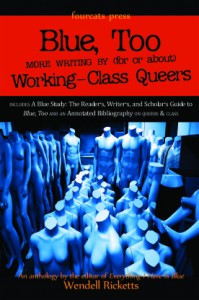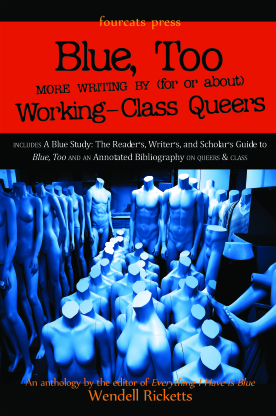 Blue, Too: More Writing by (for or about) Working-Class Queers
Blue, Too: More Writing by (for or about) Working-Class Queers
Edited by Wendell Ricketts
FourCats Press. 486 pages, $18.95
THE COMMERCIALIZATION and mainstreaming of gayness is very much on the mind of Wendell Ricketts, editor of Blue, Too, a compendium of what it means to be queer, working-class, and alive right here and now. The book is so many things—yet not too many things—that in this age of niche marketing and watered-down populism it stands out as an exception. For in it you’ll find a collection of fine short stories, a New Yorker-style essay on GLBT literature, and a comprehensive reading, viewing, and clicking guide to class issues and gay culture.
The twenty short pieces here—the front offering of the book—are varied and first-rate. Ricketts has collected short fiction, performance pieces, and autobiography (spanning all the letters in G, L, B, and T, and across races, regions, time, and relative fame of the authors) with no sacrifice of quality in the name of inclusiveness. The blossoming of love and friendship between David and Frankie in “Flowers/Flames” is moving on so many levels—poignancy, honesty, gentle humor. The lovers in “Skins,” named Rat and Crow, shatter you with the conditions that warp both their togetherness and their separation. And there are eighteen other experiences, all different, to be savored. Read these stories for their beauty as literature, for their knowing wit and sass, or for what they can teach or inspire in you. In fact, Blue, Too offers so many ways to read, so many possible starting places for conversations, and so many suggestions for what to read next that it resembles a kind of community in itself: a safe place to explore and become that has been denied the “queerly classed” for far too long.
In delving into the world of working-glass gay people, Ricketts doesn’t just pick off the easy targets—the superficial party boys, the degraded prostitutes, the doomed AIDS patients, the dangerous misfits—but also the assimilated, the married, the suburban, which have been created for straight political consumption. He takes note of who gets thrown under the electric-hybrid light rail express to equality in most of those representations—the bisexual, the transgender, the non-monogamous, the anti-capitalist—and the working-class queers.
There’s an understandable temptation, when confronted with a bleak reality (past or present) to dismiss it as too depressing or debilitating because it is not “uplifting.” This is certainly a common response to working-class literature, and often to older GLBT literature and film. Most of the young queer students in my classroom today either don’t know or don’t want to know about the closet, AIDS, the necessity of the bathhouse, or the laws that could lead to a woman’s arrest if she wore more than two pieces of clothing deemed appropriate only for men. What they like to read is young adult literature aimed at showing them a happy ending at the gay-friendly prom. What they want is encouragement; they want to know the future is going to be okay. (Don’t we all?)
Blue, Too offers readers a way to appreciate (and be inspired by) working-class queer lives by showing how to see the honor and resilience they have demonstrated. There is an unsung heroism in continuing to love another and/or oneself in the face of limited opportunity, thwarted expectations, oppression, violence, loss. You don’t have to be poor or gay to appreciate this, but it certainly helps. It also helps to have a story make visible what more popular books or films may turn away from: just demographically speaking, many of us who are queer are also working-class. You might forget that if you are fed a steady diet of Will & Grace, or Queer as Folk, or even Edmund White.
________________________________________________________
Carolyn Whitson is a professor of English at Metropolitan State University, where she teaches working-class and LGBT literature.






